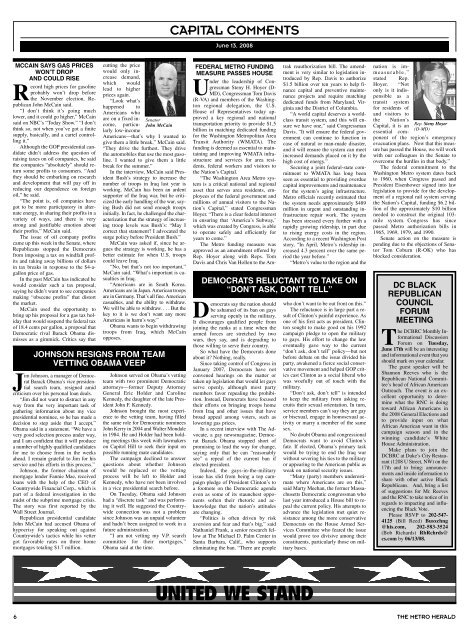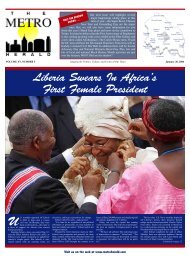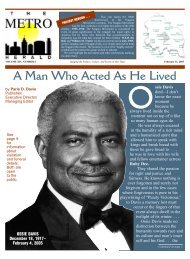happy father's day 2008 - The Metro Herald
happy father's day 2008 - The Metro Herald
happy father's day 2008 - The Metro Herald
You also want an ePaper? Increase the reach of your titles
YUMPU automatically turns print PDFs into web optimized ePapers that Google loves.
CAPITAL COMMENTS<br />
June 13, <strong>2008</strong><br />
MCCAIN SAYS GAS PRICES<br />
WON’T DROP<br />
AND COULD RISE<br />
Record high prices for gasoline<br />
probably won’t drop before<br />
the November election, Republican<br />
John McCain said.<br />
“I don’t think it’s going much<br />
lower, and it could go higher,” McCain<br />
said on NBC’s “To<strong>day</strong> Show.” “I don’t<br />
think so, not when you’ve got a finite<br />
supply, basically, and a cartel controlling<br />
it.”<br />
Although the GOP presidential candidate<br />
didn’t address the question of<br />
raising taxes on oil companies, he said<br />
the companies “absolutely” should return<br />
some profits to consumers. “And<br />
they should be embarking on research<br />
and development that will pay off in<br />
reducing our dependence on foreign<br />
oil,” he said.<br />
“<strong>The</strong> point is, oil companies have<br />
got to be more participatory in alternate<br />
energy, in sharing their profits in a<br />
variety of ways, and there is very<br />
strong and justifiable emotion about<br />
their profits,” McCain said.<br />
<strong>The</strong> issue of oil company profits<br />
came up this week in the Senate, where<br />
Republicans stopped the Democrats<br />
from imposing a tax on windfall profits<br />
and taking away billions of dollars<br />
in tax breaks in response to the $4-agallon<br />
price of gas.<br />
In the past McCain has indicated he<br />
would consider such a tax proposal,<br />
saying he didn’t want to see companies<br />
making “obscene profits” that distort<br />
the market.<br />
McCain used the opportunity to<br />
bring up his proposal for a gas tax holi<strong>day</strong><br />
that would suspend the federal tax<br />
of 18.4 cents per gallon, a proposal that<br />
Democratic rival Barack Obama dismisses<br />
as a gimmick. Critics say that<br />
cutting the price<br />
would only increase<br />
demand,<br />
which would<br />
lead to higher<br />
prices again.<br />
“Look what’s<br />
happened to<br />
Americans who<br />
are on a fixed in-<br />
Senator<br />
John McCain<br />
come, particularly<br />
low-income<br />
Americans—that’s why I wanted to<br />
give them a little break,” McCain said.<br />
“<strong>The</strong>y drive the furthest. <strong>The</strong>y drive<br />
the automobiles that use the most gasoline.<br />
I wanted to give them a little<br />
break for the summer.”<br />
In the interview, McCain said President<br />
Bush’s strategy to increase the<br />
number of troops in Iraq last year is<br />
working. McCain has been an ardent<br />
supporter of the Iraq war, but he criticized<br />
the early handling of the war, saying<br />
Bush did not send enough troops<br />
initially. In fact, he challenged the characterization<br />
that the strategy of increasing<br />
troop levels was Bush’s: “May I<br />
correct that statement I advocated the<br />
surge policy before President Bush.”<br />
McCain was asked if, since he argues<br />
the strategy is working, he has a<br />
better estimate for when U.S. troops<br />
could leave Iraq.<br />
“No, but that’s not too important,”<br />
McCain said. “What’s important is casualties<br />
in Iraq.<br />
“Americans are in South Korea.<br />
Americans are in Japan. American troops<br />
are in Germany. That’s all fine. American<br />
casualties, and the ability to withdraw.<br />
We will be able to withdraw.... But the<br />
key to it is we don’t want any more<br />
Americans in harm’s way.”<br />
Obama wants to begin withdrawing<br />
troops from Iraq, which McCain<br />
opposes.<br />
JOHNSON RESIGNS FROM TEAM<br />
VETTING OBAMA VEEP<br />
Jim Johnson, a manager of Democrat<br />
Barack Obama’s vice presidential<br />
search team, resigned amid<br />
criticism over his personal loan deals.<br />
“Jim did not want to distract in any<br />
way from the very important task of<br />
gathering information about my vice<br />
presidential nominee, so he has made a<br />
decision to step aside that I accept,”<br />
Obama said in a statement. “We have a<br />
very good selection process under way,<br />
and I am confident that it will produce<br />
a number of highly qualified candidates<br />
for me to choose from in the weeks<br />
ahead. I remain grateful to Jim for his<br />
service and his efforts in this process.”<br />
Johnson, the former chairman of<br />
mortgage lender Fannie Mae, received<br />
loans with the help of the CEO of<br />
Countrywide Financial Corp., which is<br />
part of a federal investigation in the<br />
midst of the subprime mortgage crisis.<br />
<strong>The</strong> story was first reported by the<br />
Wall Street Journal.<br />
Republican presidential candidate<br />
John McCain had accused Obama of<br />
hypocrisy for speaking out against<br />
Countrywide’s tactics while his vetter<br />
got favorable rates on three home<br />
mortgages totaling $1.7 million.<br />
Johnson served on Obama’s vetting<br />
team with two prominent Democratic<br />
attorneys—former Deputy Attorney<br />
General Eric Holder and Caroline<br />
Kennedy, the daughter of the late President<br />
John F. Kennedy.<br />
Johnson brought the most experience<br />
to the vetting team, having filled<br />
the same role for Democratic nominees<br />
John Kerry in 2004 and Walter Mondale<br />
in 1984. He and Holder had been holding<br />
meetings this week with lawmakers<br />
on Capitol Hill to seek their input on<br />
possible running mate candidates.<br />
<strong>The</strong> campaign declined to answer<br />
questions about whether Johnson<br />
would be replaced or the vetting<br />
process will be left to Holder and<br />
Kennedy, who have not been involved<br />
in a vice presidential search before.<br />
On Tues<strong>day</strong>, Obama said Johnson<br />
had a “discrete task” and was performing<br />
it well. He suggested the Countrywide<br />
connection was not a problem<br />
since Johnson was an unpaid volunteer<br />
and hadn’t been assigned to work in a<br />
future administration.<br />
“I am not vetting my V.P. search<br />
committee for their mortgages,”<br />
Obama said at the time.<br />
Democrats say the nation should<br />
be ashamed of its ban on gays<br />
serving openly in the military.<br />
It discourages qualified people from<br />
joining the ranks at a time when the<br />
armed forces are stretched by two<br />
wars, they say, and is degrading to<br />
those willing to serve their country.<br />
So what have the Democrats done<br />
about it Nothing, really.<br />
Since taking control of Congress in<br />
January 2007, Democrats have not<br />
convened hearings on the matter or<br />
taken up legislation that would let gays<br />
serve openly, although most party<br />
members favor repealing the prohibition.<br />
Instead, Democrats have focused<br />
their efforts on bringing troops home<br />
from Iraq and other issues that have<br />
broad appeal among voters, such as<br />
lowering gas prices.<br />
In a recent interview with <strong>The</strong> Advocate,<br />
a gay newsmagazine, Democrat<br />
Barack Obama stopped short of<br />
promising to lead the way for change,<br />
saying only that he can “reasonably<br />
see” a repeal of the current ban if<br />
elected president.<br />
Indeed, the gays-in-the-military<br />
issue has slid from being a top campaign<br />
pledge of President Clinton’s to<br />
a footnote on the Democratic agenda<br />
even as some of its staunchest opponents<br />
soften their rhetoric and acknowledge<br />
that the nation’s attitudes<br />
are changing.<br />
“Politics is often driven by risk<br />
aversion and fear and that’s big,” said<br />
Nathaniel Frank, a senior research fellow<br />
at <strong>The</strong> Michael D. Palm Center in<br />
Santa Barbara, Calif., who supports<br />
eliminating the ban. “<strong>The</strong>re are people<br />
FEDERAL METRO FUNDING<br />
MEASURE PASSES HOUSE<br />
Under the leadership of Congressman<br />
Steny H. Hoyer (D-<br />
MD), Congressman Tom Davis<br />
(R-VA) and members of the Washington<br />
regional delegation, the U.S.<br />
House of Representatives to<strong>day</strong> approved<br />
a key regional and national<br />
transportation priority to provide $1.5<br />
billion in matching dedicated funding<br />
for the Washington <strong>Metro</strong>politan Area<br />
Transit Authority (WMATA). <strong>The</strong><br />
funding is deemed as essential to maintaining<br />
and improving WMATA infrastructure<br />
and services for area residents,<br />
federal workers and visitors to<br />
the Nation’s Capital.<br />
“<strong>The</strong> Washington Area <strong>Metro</strong> system<br />
is a critical national and regional<br />
asset that serves area residents, employees<br />
of the federal government and<br />
millions of annual visitors to the Nation’s<br />
Capital,” stated Congressman<br />
Hoyer. “<strong>The</strong>re is a clear federal interest<br />
in ensuring that ‘America’s Subway,’<br />
which was created by Congress, is able<br />
to operate safely and efficiently for<br />
years to come.”<br />
<strong>The</strong> <strong>Metro</strong> funding measure was<br />
approved as an amendment offered by<br />
Rep. Hoyer along with Reps. Tom<br />
Davis and Chris Van Hollen to the Amtrak<br />
reauthorization bill. <strong>The</strong> amendment<br />
is very similar to legislation introduced<br />
by Rep. Davis to authorize<br />
$1.5 billion over ten years to help finance<br />
capital and preventive maintenance<br />
projects and require matching<br />
dedicated funds from Maryland, Virginia<br />
and the District of Columbia.<br />
“A world capital deserves a worldclass<br />
transit system, and this will ensure<br />
we have one,” said Congressman<br />
Davis. “It will ensure the federal government<br />
can continue to function in<br />
case of natural or man-made disaster,<br />
and it will ensure the system can meet<br />
increased demands placed on it by the<br />
high cost of energy.”<br />
Securing a joint federal-state commitment<br />
to WMATA has long been<br />
seen as essential to providing overdue<br />
capital improvements and maintenance<br />
for the system’s aging infrastructure.<br />
<strong>Metro</strong> officials recently estimated that<br />
the system needs approximately $489<br />
million in urgent and outstanding infrastructure<br />
repair work. <strong>The</strong> system<br />
has been stressed every further with a<br />
rapidly growing ridership, in part due<br />
to rising energy costs in the region.<br />
According to a recent Washington Post<br />
story, “In April, <strong>Metro</strong>’s ridership increased<br />
4.3 percent over the same period<br />
the year before.”<br />
“<strong>Metro</strong>’s value to the region and the<br />
DEMOCRATS RELUCTANT TO TAKE ON<br />
“DON’T ASK, DON’T TELL”<br />
who don’t want to be out front on this.”<br />
<strong>The</strong> reluctance is in large part a result<br />
of Clinton’s painful experience. As<br />
one of his first acts as president, Clinton<br />
sought to make good on his 1992<br />
campaign pledge to open the military<br />
to gays. His effort to change the law<br />
eventually gave way to the current<br />
“don’t ask, don’t tell” policy—but not<br />
before debate on the issue divided his<br />
party, awakened a fierce social conservative<br />
movement and helped GOP critics<br />
cast Clinton as a social liberal who<br />
was woefully out of touch with the<br />
military.<br />
“Don’t ask, don’t tell” is intended<br />
to keep the military from asking recruits<br />
their sexual orientation. In turn,<br />
service members can’t say they are gay<br />
or bisexual, engage in homosexual activity<br />
or marry a member of the same<br />
sex.<br />
No doubt Obama and congressional<br />
Democrats want to avoid Clinton’s<br />
fate. If elected, Obama’s primary task<br />
would be trying to end the Iraq war<br />
without severing his ties to the military<br />
or appearing to the American public as<br />
weak on national security issues.<br />
“Many (party) members underestimate<br />
where Americans are on this,”<br />
said Marty Meehan, the former Massachusetts<br />
Democratic congressman who<br />
last year introduced a House bill to repeal<br />
the current policy. His attempts to<br />
advance the legislation met quiet resistance<br />
among the more conservative<br />
Democrats on the House Armed Services<br />
Committee who feared the issue<br />
would prove too divisive among their<br />
constituents, particularly those on military<br />
bases.<br />
Rep. Steny Hoyer<br />
(D-MD)<br />
nation is immeasurable,”<br />
stated Rep.<br />
Hoyer. “Not<br />
only is it indispensible<br />
as a<br />
transit system<br />
for residents of<br />
and visitors to<br />
the Nation’s<br />
Capital, it is an<br />
essential component<br />
of the region’s emergency<br />
evacuation plans. Now that this measure<br />
has passed the House, we will work<br />
with our colleagues in the Senate to<br />
overcome the hurdles in that body.”<br />
<strong>The</strong> federal commitment to the<br />
Washington <strong>Metro</strong> system dates back<br />
to 1960, when Congress passed and<br />
President Eisenhower signed into law<br />
legislation to provide for the development<br />
of a regional rail system serving<br />
the Nation’s Capital, funding $6.2 billion<br />
of the approximately $10 billion<br />
needed to construct the original 103-<br />
mile system. Congress has since<br />
passed <strong>Metro</strong> authorization bills in<br />
1965, 1969, 1979, and 1990.<br />
Senate action on the measure is<br />
pending due to the objections of Senator<br />
Tom Coburn (R-OK) who has<br />
blocked consideration.<br />
DC BLACK<br />
REPUBLICAN<br />
COUNCIL<br />
FORUM<br />
MEETING<br />
<strong>The</strong> DCBRC Monthly Informational<br />
Discussion<br />
Forum on Tues<strong>day</strong>,<br />
June 17th will be an interesting<br />
and informational event that you<br />
should mark on your calendar.<br />
<strong>The</strong> guest speaker will be<br />
Shannon Reeves who is the<br />
Republican National Committee’s<br />
head of African American<br />
Outreach. <strong>The</strong> event is an excellent<br />
opportunity to determine<br />
what the RNC is doing<br />
toward African Americans in<br />
the <strong>2008</strong> General Elections and<br />
to provide input on what<br />
African American want in this<br />
campaign season and in the<br />
winning candidate’s White<br />
House Administration.<br />
Make plans to join the<br />
DCBRC at Duke’s City Restaurant<br />
(1208 U Street, NW) on the<br />
17th and to bring: announcements<br />
and inside information to<br />
share with other active Black<br />
Republicans. And, bring a list<br />
of suggestions for Mr. Reeves<br />
and the RNC to take notice of in<br />
regards to impacting and influencing<br />
the Black Vote.<br />
Please RSVP to 202-547-<br />
4125 (Bill Reed) Busxchng<br />
@his.com, 202-583-3524<br />
(Bob Richards) RbRchrds@<br />
cs.com by 06/13/08.<br />
UNITED WE STAND<br />
6 THE METRO HERALD

















